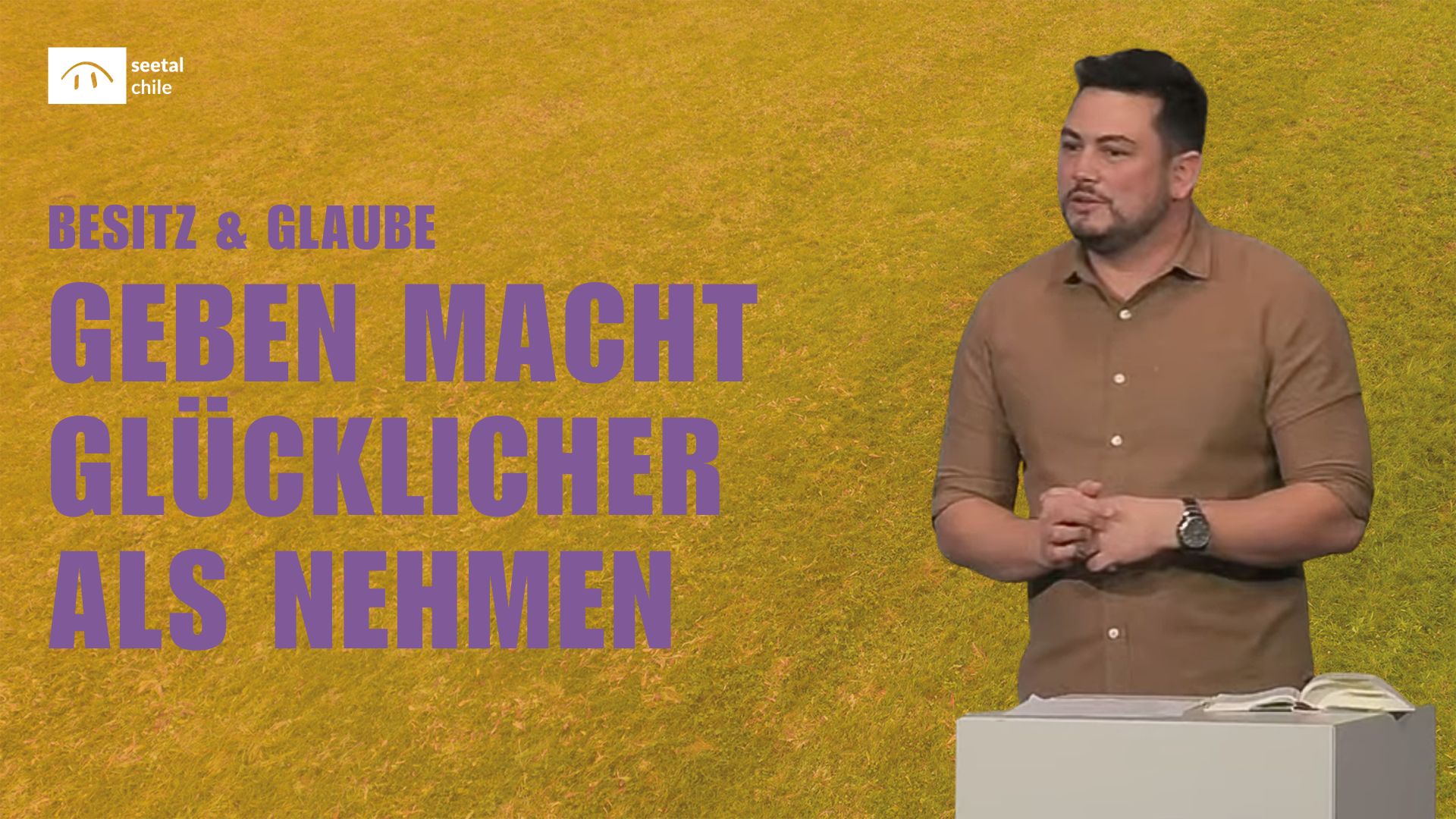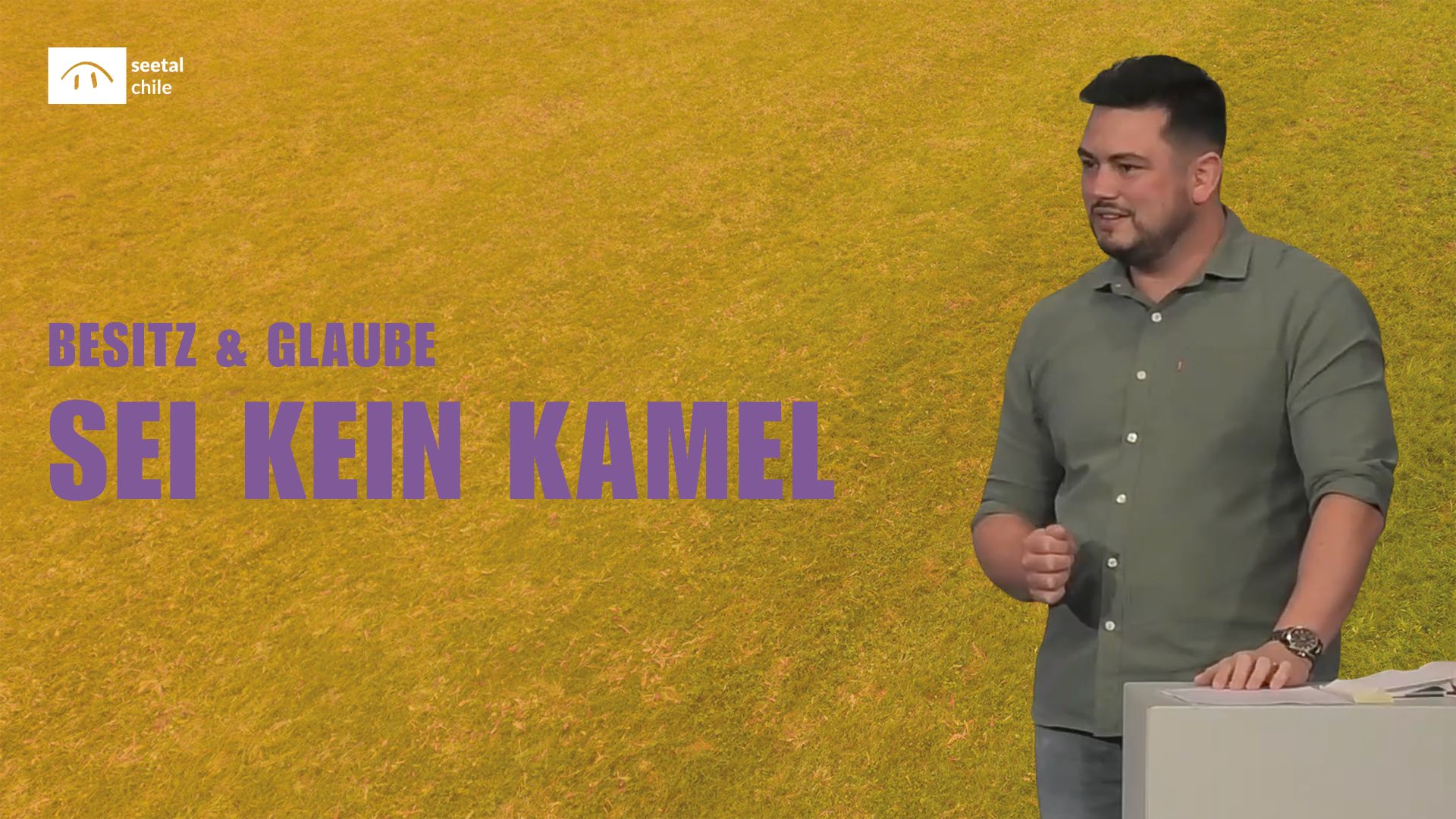Faith demands action
Series: Holy – Holy – Holy | Bible text: James 2:17
Often we think faith has only something to do with an inner attitude and our thoughts. However, the Bible teaches us that faith also has a lot to do with how we act and behave. How rooted our faith is is expressed in our actions. It is not a matter of pious actions, but of acting out of faith. And this faith always has its root in the encounter with the holy God.
I would like to start the sermon today with a little joke. An elderly couple is lying in bed at night. The husband is restless, can’t sleep and keeps tossing and turning. At some point it becomes too much for the wife and she asks him what is wrong. He starts almost mumbling, «Well, um, don’t you think it’s time again for…well you know.» The woman doesn’t quite understand. «Honey, what do you think?» He in turn replies, «Come on, you know what I mean. It starts with S and ends with X.» The woman, now quite indignant, says: «Listen, it’s already half past eleven at night. Even you should realise that it’s simply too late to call Spitex now!
The faith of Abraham and Sarah
In fact, today I am going to tell you about an elderly couple from the Bible who felt very much the same way. We are talking about Abraham and Sarah. When Abraham was 75 years old, God promised to make him a great nation, to give him many descendants and to give these descendants a great, fertile land. But Abraham and Sarah were already old and could not produce any children until then. Even after the promise, this did not change for a long time. At some point, the two of them also tried it in their own way, with Abraham fathering a child with Sarah’s maid Hagar. To cut a long story short, apart from a lot of drama, this action did not bring much and although Abraham now had a son, this was not the fulfilment of God’s promise.
In Genesis 18 we can read how their story continues after God repeated his promise several times and made a covenant with Abraham. God appeared to Abraham in the form of three men. Abraham immediately understands who is standing before him and pulls out all the stops to offer the Lord a feast. As they ate, the following scene took place: «And he said, Verily in the year about this time will I come again unto thee; behold, Sarah thy wife hath a son. And Sarah was listening at the entrance of the tent which was behind him. And Abraham and Sarah were old and advanced in years: and Sarah was no more after the manner of women. And Sarah laughed within herself, and said, After that I am grown old, I should ⟨yet⟩ Have love lust? And ⟨also⟩ my lord is yes old!» (Genesis 18:10–12 ELB).
I’m sorry to disappoint all those who thought Sarah was laughing because she no longer had her period. She didn’t have her period, but she laughed because they hadn’t slept together for a long time. Why do I emphasise this so much? After all, it can be seen as a simple detail. For me it is not just a detail, but shows the absolutely close connection between faith and action. Abraham and Sarah were enlightened enough to know how children are born. Wouldn’t it have been absolutely logical to have sex if they believed that God would give them a child? They would probably have said with great conviction that they believe God and trust in his word. However, their actions relentlessly reveal that at that moment their faith did not go very far.
Here we realise how closely faith and action are interwoven. My husband and I have tried countless sports. One sport that we like very much is climbing. Although we enjoy it very much, we very seldom take time for it and as a result there are often long breaks between two visits to the climbing gym. While my husband is very fearless in this area, it’s a different story for me. I’m always a bit cautious on the first few holds until I get used to it again. If you were to ask me today if I trust my husband, I would tell you very clearly and with conviction «Yes, absolutely! I trust him blindly!». However, if I’m clinging to a wall 12 metres above the ground and you ask me if I trust my husband, it’s a completely different story. I’m suddenly unsure, I find excuses why I might not trust him completely at that moment, and I have to admit to myself that I probably don’t trust so blindly after all. It takes my conscious decision at that moment, despite the fear, to trust my husband after all. There, this decision manifests itself very clearly in my actions. I show my decision to trust when I let go of the buttons on the wall and let myself fall into the rope. It is also so much easier to tell God in our songs, prayers and conversations with others from church that one trusts God completely and has a deeply rooted faith. But in our behaviour, unfortunately, it often reveals that our faith is indeed often smaller than a mustard seed.
Faith colloquial vs. faith biblical
The reason for this discrepancy between our speech and our actions is, in my opinion, not so much our bad faith as our understanding of the concept of «faith». When we speak colloquially of faith, we mean something somewhere between assuming and knowing. I think there are two big misconceptions about faith that are probably due to cultural understanding and contradict the biblical understanding of faith. First, we think faith is something that happens in our head and maybe our heart. We speak of faith as a concept tied to our thinking. Partly it is still related to our emotions, but it is not tied to our actions. In the Bible, however, we see a different understanding of faith. In James 2:17–22 we read: «So also faith, if it has no works, is dead in itself. But someone will say, «You have faith, and I have works. Show me your faith without works, and I will show you faith from my works! You believe that ⟨only⟩ one is God? You are right; even the demons believe and tremble. But wilt thou know, thou vain man, that faith without works is useless? Was not Abraham our father justified by works, when he laid Isaac his son upon the altar of sacrifice? Thou seest that faith worked together with his works, and faith was perfected out of works» (James 2:17–22 ELB).
These are harsh words and Luther would have liked to delete them from the Bible. We know that it is faith that saves us and not deeds. In any case, that is the case. But this Bible passage shows us how closely interwoven faith and action are. The Bible paints such a much more holistic picture of faith. I think it is so beautiful the way it is described here in James. Abraham is the great model of faith. Why is that so? Because his deep-rooted faith was revealed in how unconditionally he obeyed God. His deeds were the visible proof of his faith. It is also important for me to mention here what the thrust is. I do not want to preach pious behaviour here. It is not the faith that comes out of deeds. It is the faith that challenges us to the deeds. The deeds do not produce the faith, but complete it. It is important for me to emphasise that my point is not to indict our behaviour. I simply want to take you on a journey to discover how much more expansive faith is. And yes, I agree that ultimately it may be more connected to our actions than we often like. It can be uncomfortable to realise that we are not very good at hiding what our faith is like. But that is the story of the Bible. It is about people whose behaviour reveals their faith or, indeed, often their unbelief. Without this revelation, faith remains a nice idea, like a thousand other nice philosophical ideas. It sounds harsh, but sometimes I wish the statements and promises of the Bible would influence my behaviour as much as the prophecies of my weather app.
The second misconception about faith is that it is a confident assumption. I am convinced that faith is more than a hope or a presumption. To understand this, let’s read Hebrews 11:1–2. «But faith is a reality of what one hopes for, a conviction of things not seen. For by it the ancients obtained testimony»(Hebrews 11:1–2 ELB). In part, the word «hypostasis», which is translated here as «reality», is translated as confidence. If we believe many wise theologians from history, it quickly becomes clear that we are closer with reality. Hypostasis means foundation or even basis of existence, essence, reality or actuality. I think you agree with me that if faith is a reality, a reality, that it is much more than just hoping for something. Also the word «being convinced» is much stronger than simply a firm confidence. The word can also be translated as «being convinced». It is otherwise mentioned in context when the evidence is so clear that in a legal dispute it can be clearly assumed that the accused is guilty or innocent. Are we aware that our faith is not based on assumptions, but on a reality. I will not go into the evidence itself here, but note that purely from a historical point of view there is good evidence that Jesus was crucified and resurrected. There are really very good reasons to believe what the Bible says. The Word of God is the basis of our faith. And this faith is by no means based on a faint hope, which is almost naïve. I will gladly grant you that if you believe what is written in the Bible, it does not have much to do with a foolish trust, but with a tangible reality.
Encounter with the holy God as the root of faith
Before I conclude, I want to talk again about Abraham and Sarah. As promised, Sarah gave birth to a son a year later. This son was finally the fulfilment of God’s promise. It does not say exactly, but I would be very, very sure that Abraham and Sarah conceived this boy naturally. Their faith had been reawakened and given new impetus. Through what did this happen? It was the encounter with the Lord. It was the Word of the Holy God that awakened new faith in Abraham and Sarah. This encounter itself was not pleasant for Sarah, for the Lord revealed her unbelief. She was exposed at that moment. And yet it was precisely this encounter that strengthened her faith anew. It was her wake-up call that her actions testify to a dying faith. But it was also a wake-up call for her to make a new decision to hold on to God’s promise. It is in their deeds, in their obedience, that their faith is completed. The result is the glorification of God. That is the direction of action. From the encounter comes faith and from faith follows action. Whether God encounters you is not up to you. But it is our responsibility to seek God with all our heart. Secondly, we have the privilege of having access to God’s Word. Whenever we want, we can immerse ourselves in His Word.
Possible questions for the small group
Read the Bible text: James 2:17
- What promises has God given us in his Word? What attributes are attributed to God in the Bible?
- Now think together about how it could manifest itself in our actions if we really believe the promises and believe in a God as described in the Bible? (For example, God is our provider. Do we behave like this or does our behaviour perhaps sometimes show more that we see ourselves as providers)?
- Are there areas in your life where you are challenged to make a decision and reaffirm your trust in God through your actions?
- How would you define «faith»? What constitutes faith for you?
- We cannot force an encounter with God, but we can reach out for it. Discuss how this can happen.
- Share how you can stay tuned to dive into God’s Word again and again.




